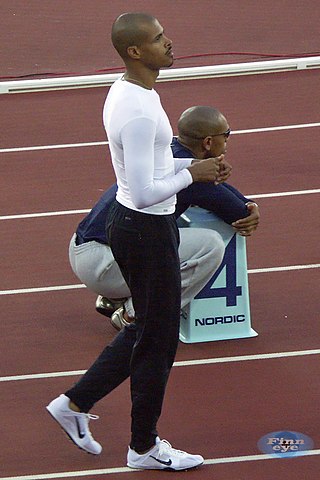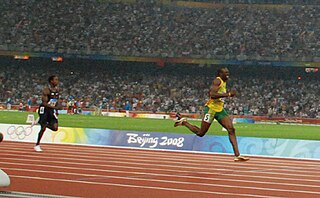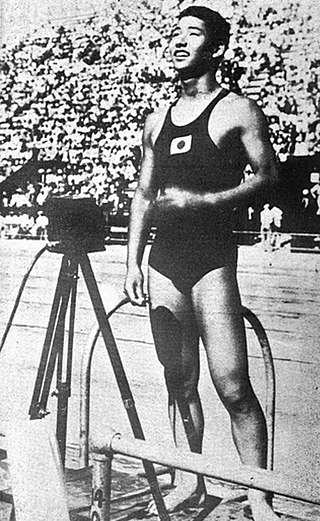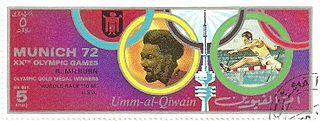The men's 400 metres at the 2004 Summer Olympics as part of the athletics program were held at the Athens Olympic Stadium from August 20 to 23. Sixty-two athletes from 48 nations competed. The event was won by Jeremy Wariner of the United States, the sixth in what would ultimately be 7 consecutive American victories stretching from 1984 to 2008 and the 18th overall title in the event by the United States. The United States swept the podium for the 4th time in the event.

The men's 400 metres hurdles at the 2004 Summer Olympics as part of the athletics program were held at the Athens Olympic Stadium from August 23 to 26. There were 35 competitors from 24 nations. The event was won by Félix Sánchez of the Dominican Republic, the nation's first medal in the men's 400 metres hurdles. Silver went to Danny McFarlane of Jamaica, returning to the podium in the event for the first time since 1992. Naman Keïta's bronze was France's first medal in the event in over 100 years; the last Frenchman to medal in the long hurdles was Henri Tauzin in 1900. The United States' five-Games gold medal streak ended; for only the second time in the history of the event, Americans competed but won no medals.

The men's 1500 metres at the 2004 Summer Olympics as part of the athletics program were held at the Athens Olympic Stadium from August 20 to 24. Thirty-eight athletes from 26 nations competed. The event was won by Hicham El Guerrouj of Morocco, the nation's first title in the event after coming second twice ; El Guerrouj was the fifth man to win a second medal in the event. Bernard Lagat's silver put Kenya on the podium in the event for the third straight year; the United States and Great Britain were the only other nations to have accomplished that. It also made Lagat the sixth man to win two medals in the event, just behind El Guerrouj in both 2000 and 2004. Rui Silva's bronze was Portugal's first medal in the event.

The men's 1500 metres event at the 1988 Summer Olympics in Seoul, South Korea had an entry list of 59 competitors from 46 nations, with four qualifying heats (59) and two semi-finals (26), before the final (12) took place on Saturday October 1, 1988. The maximum number of athletes per nation had been set at 3 since the 1930 Olympic Congress. The event was won by Peter Rono of Kenya, the nation's first title in the event since 1968 and second overall.

The men's 100 metres sprint event at the 2008 Olympic Games took place on 15 and 16 August at the Beijing National Stadium. Eighty athletes from 64 nations competed. Each nation was limited to 3 athletes per rules in force since the 1930 Olympic Congress. The final was won by Jamaican Usain Bolt in a world record time of 9.69 seconds. It was Jamaica's first title in the event, and first medal in the event since 1976. Jamaica became the first country to join the men's 100 metre winners since Trinidad and Tobago, also in 1976; Richard Thompson won that country's fourth overall medal in the event with his silver.

The men's 200 metres at the 2008 Summer Olympics took place on 18–20 August at the Beijing National Stadium. There were 63 competitors from 53 nations. Jamaican Usain Bolt set a new world record of 19.30 seconds in the final, and won by the largest margin of victory in an Olympic 200 metres final. It was Jamaica's first victory in the event since 1976 and second overall, matching Canada and Italy for second-most. The apparent silver and bronze medalists, Churandy Martina of the Netherlands Antilles and Wallace Spearmon of the United States, were both disqualified. Those medals went to Americans Shawn Crawford and Walter Dix, who had been fourth and fifth across the finish line; Crawford gave his silver medal to Martina afterward. Crawford was the 10th man to win two medals in the 200 metres, and the third for whom those medals were gold and silver; nobody had yet won two gold medals.

The men's 1500 metres at the 2008 Summer Olympics took place on 15–19 August at the Beijing National Stadium. Forty-eight athletes from 30 nations competed.

The men's 100 metre freestyle was a swimming event held as part of the swimming at the 1932 Summer Olympics programme. It was the eighth appearance of the event, which had not been featured only at the 1900 Games. The competition was held from Saturday August 6, 1932 to Sunday August 7, 1932. Twenty-two swimmers from ten nations competed. Nations had been limited to three swimmers each since the 1924 Games. The event was won by Yasuji Miyazaki of Japan, snapping a five-Games American win streak. Japan was only the third nation to win a gold medal in the event. The final was entirely made up of Japanese and American swimmers, three each; Japan took the top two places as Tatsugo Kawaishi earned silver. The top American, Albert Schwartz, earned bronze. While the American win streak had ended at five, the nation's podium streak ran to seven Games.

The men's 100 metre freestyle was a swimming event held as part of the swimming at the 1936 Summer Olympics programme. It was the ninth appearance of the event, which had not been featured only at the 1900 Games. The competition was held on Saturday and Sunday, 8 and 9 August 1936. Forty-five swimmers from 23 nations competed. Nations had been limited to three swimmers each since the 1924 Games. The event was won by Ferenc Csik of Hungary, the nation's first victory in the event since 1904 and third overall. For the second consecutive Games, Japan took two medals in the 100 metre freestyle, this time silver and bronze. The United States' seven-Games medal streak in the event ended as the nation's best result was sixth place by Peter Fick.

The men's 100 metres competition at the 2012 Summer Olympics in London, United Kingdom was held at the Olympic Stadium on 4–5 August 2012. Seventy-four athletes from 61 nations competed. Each nation was limited to 3 athletes per rules in force since the 1930 Olympic Congress. The competition comprised four rounds: a preliminary round for entrants without the minimum qualifying standard, a heats round, followed by three semi-finals of eight athletes each, which then reduced to eight athletes for the final.
The women's 100 metres hurdles competition at the 2012 Summer Olympics in London, United Kingdom was held at the Olympic Stadium on 6–7 August.
The men's 800 metres competition at the 2012 Summer Olympics in London, United Kingdom, was held at the Olympic Stadium on 6–9 August. Fifty-five athletes from 43 nations competed. The event was won by David Rudisha of Kenya, the second consecutive and fourth overall title for Kenya in the event. Rudisha would later become the fourth man to successfully defend his Olympic 800 metres title, and the 11th to win two medals of any kind in the event. Nijel Amos' silver medal was the first Olympic medal ever for Botswana. Timothy Kitum of Kenya won the bronze medal.

The Women's 800 metres competition at the 2012 Summer Olympics in London, United Kingdom. The event was held at the Olympic Stadium on 8–11 August. The race was won by Mariya Savinova, but she has since been stripped of the gold medal for doping.
The men's 400 metres was an event at the 1972 Summer Olympics in Munich. The competition was held on 3, 4 and 7 September. Sixty-four athletes from 49 nations competed. The maximum number of athletes per nation had been set at 3 since the 1930 Olympic Congress. The event was won by Vince Matthews of the United States, the nation's fifth consecutive and 12th overall victory in the event. The Americans' hopes to repeat their podium sweep of four years earlier were dashed by injury in the final. Bronze medalist Julius Sang became the first black African to win a sprint Olympic medal, earning Kenya's first medal in the event.

The men's 110 metres hurdles event at the 1972 Summer Olympics in Munich was held from 3–7 September. Thirty-nine athletes from 27 nations competed. The maximum number of athletes per nation had been set at 3 since the 1930 Olympic Congress. The event was won by Rod Milburn of the United States, the nation's ninth of nine consecutive victories and the 15th overall gold medal in the event for the Americans. Guy Drut's silver was France's first medal in the event and the best result by a non-American since 1936.
The men's canoe sprint K-1 200 metres competition at the 2012 Olympic Games in London took place between 10 and 11 August at Eton Dorney.

The men's 110 metre hurdles at the 2004 Summer Olympics as part of the athletics program were held at the Athens Olympic Stadium from August 24 to 27. Forty-seven athletes from 34 nations competed. The event was won by Liu Xiang of China, the nation's first medal in the event. Terrence Trammell and Anier García became the 11th and 12th men to win multiple medals in the 110 metres hurdles.
The men's canoe sprint C-1 200 metres competition at the 2016 Olympic Games in Rio de Janeiro took place between 17 and 18 August at Lagoa Stadium.
The men's canoe sprint K-1 200 metres at the 2016 Olympic Games in Rio de Janeiro took place between 19 and 20 August at Lagoa Stadium. The medals were presented by José Perurena López, IOC member, Spain and Frank Garner, Board Member of the ICF.
The men's eight rowing competition at the 1980 Summer Olympics took place at the Krylatskoye Rowing Canal in Moscow, Soviet Union. The event was held from 21 to 26 July. There were 9 boats from 9 nations, with each nation limited to a single boat in the event. The first two places were the same as in 1976, with East Germany successfully defending its title and Great Britain repeating as runner-up. The 1976 bronze medalist, New Zealand, was not competing; the Soviet Union took bronze in 1980.










